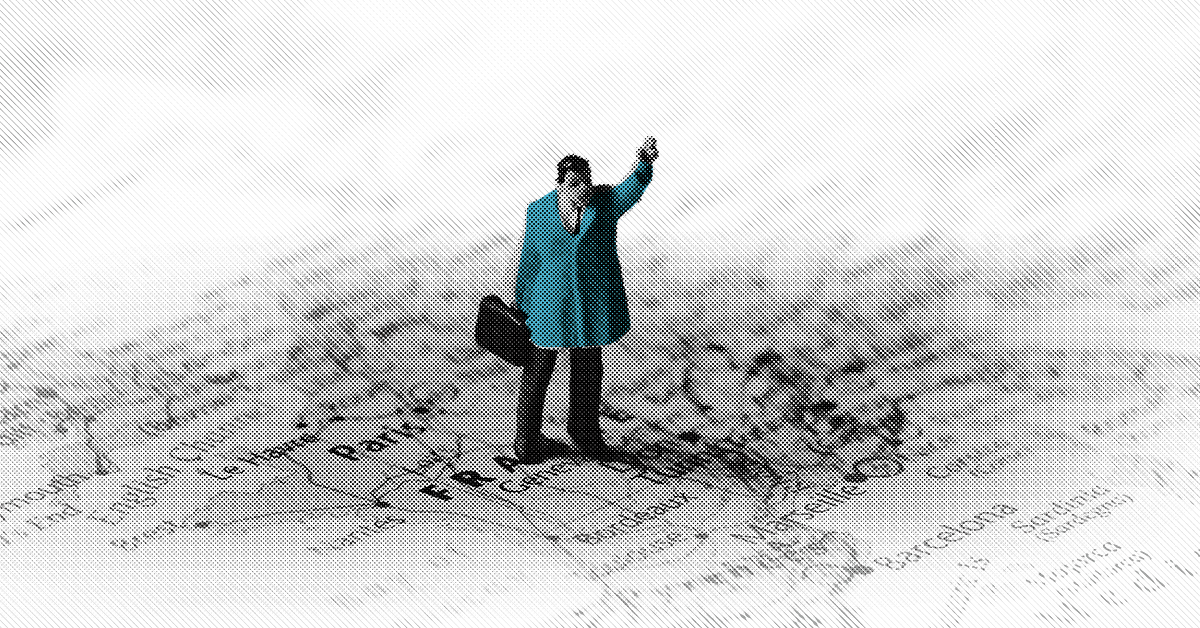Jakub Majmurek: Emmanuel Macron managed to win the presidential elections in France. The whole Europe is relieved. But does his victory really mean that the future of the European project is safe?
Alain Délétroz: His victory means that the future of the European project is much safer. As we have seen during the campaign, Mrs Le Pen and the senior staff of her team could not avoid defending Vichy, the French collaborating state during the German occupation. If she had won, not only the European Union would be in shambles today, but so would the level of democracy in France, a country still under the emergency state.
Do you think that after Madame Le Pen’s defeat we’re going to see any serious populist challenges to European project soon? If you think we are, where are they going to pop up?
Yes, populism has become a kind of “Zeitgeist.” It is there and it will prosper mainly on mainstream politicians’ weaknesses and cowardice. The upcoming German elections should not represent a big danger, even though populism there is also on the rise. But Italy is a country to watch. People are very unhappy and Pepe Grillo’s Five Star Movement could become a central governing force.
Would it be a calamity for the future of the EU?
It would send some shivers across the EU, but Five Star Movement has still such a vague program that one could hope they would have a sober approach to reality and particularly to the euro.
What does Macron’s victory mean for the cooperation between France and Germany? We know that in the past Macron clashed with Merkel over the issue of Greek debt. Are their visions of the future of Europe compatible?
The length and depth of the Greek crisis and Brexit have changed many things in Europe including in Mrs Merkel’s mind. Macron has stated over and over during the campaign that he wants to re-establish a strong Franco-German cooperation line. He had the courage to say loud and clear that for your partner to listen to you, you must be credible, thus implicitly admitting that France is not credible in Berlin for as long as it proves incapable of reforming itself.
During the campaign, Macron was talking a lot about the necessity of social and economic solidarity in Europe. Do you think he would be able and willing to translate those promises into actual politics? What his victory would mean for the Greek government, smitten with debt and austerity?
He will certainly want to push that, but he does not yet have a deep experience with the Council of the European Union. He will soon discover how building a consensus on these politically very sensitive issues requires patience, diplomatic skills, and a vision acceptable by all.
Would you agree that Macron’s victory gives a strong green light for a project of two- or multi-speed Europe? A scenario where Germany, France, Benelux, and maybe Italy are pursuing closer integration, leaving behind other member states, seems very plausible now, doesn’t it?
During his campaign speeches Macron has constantly emphasized the need for the eurozone to have a much better governance structure. He will certainly concentrate his efforts at getting that done.
The upcoming German elections should not represent a big danger, even though populism there is also on the rise. But Italy is a country to watch.
He also thinks that a monetary union cannot survive at longer term without the convergence in its tax and social policies. But he can do that without neglecting the rest of the EU.
When I was following what Macron was saying about Europe, it struck me that he was talking almost exclusively about eurozone countries. Eastern Europe or Nordic countries were almost completely absent from his European narration.
You are quite right: he has not been speaking very much about this region during the campaign. He knows the Scandinavian countries and admires their economic flexibility, but he has been less vocal on Central Europe, except for some harsh words for those in Warsaw and Budapest who threaten democracy.
Macron is not alone in his criticism of those governments. Do you think that the tensions between Brussels and Kaczyński or Orbán can escalate to the point when European Commission would indeed punish Poland or Hungary with actual sanctions? What consequences it could have for the future of European project?
I do not expect “sanctions” to be set up against Poland or Hungary in the same way as they have been set up against Russia after the annexation of Crimea. But yes, there is a huge fatigue with autocratic leaders in the EU countries that are receiving structural funds from Brussels. For many in Macron’s political movement the very idea that French taxpayers’ money can support governments that violate European democratic principles is just unacceptable. I would expect strong discussion in Brussels on that issue once the new government is formed in Paris.
Do you think that a conflict between Western capitals and Warsaw could aid Moscow to break the united European front on the issue on Russian politics?
No, not at all, for the simple reason that all hardliners in Warsaw are much more antiRussian than the mainstream politicians.
How is Macron’s victory going to affect the EU-Russia relations? Everyone is assuming that Macron’s victory means a continuation of the status quo (sanctions, etc.) – do you agree?
Yes, I think Macron will not push for a change of status quo for as long as nothing changes on Russia’s position in Ukraine. Putin’s direct support of Marine Le Pen and the hacking of Macron’s political movement’s e-mails the very last day of his campaign were no smart things to do from the Russian side. The relationship starts under a pretty cold weather to say the least.
If Angela Merkel wins in Germany in October, we can expect that also Berlin is not going to change its politics towards Moscow. How would Russia react to such scenario?
Yes, I think it is pretty safe to assume that. Russia will continue its present line: building up its military, keeping a high level of anti-EU speeches in its state-run media, and trying to disrupt elections in the West whenever an opportunity to do so emerges.
It has been three years since Russia annexed Crimea and started the conflict in Eastern Ukraine. Nothing points to any plausible resolution of that conflict in the nearest future. How do you think it’s going to evolve in the next year? Does the EU have any means to influence the situation in Eastern Ukraine towards an outcome which would be welcome from the point of view of European security?
The EU has clearly outsourced the Donbass conflict to France and Germany, who have been negotiating the Minsk agreement without any EU input. The EU is also accused by the de facto authorities in the Donbass and by Moscow of being a party to the conflict.
The length and depth of the Greek crisis and Brexit have changed many things in Europe including in Mrs Merkel’s mind. Macron has stated during the campaign that he wants to re-establish a strong Franco-German cooperation line.
So I do not see a big role for Brussels in the policy discussion at this state. But the EU is and will continue to be the main modernization factor in Ukraine, which is essential to move forward economically and politically.
Many European leaders were afraid of Trump’s presidency, worried whether he would feel obliged to keep American commitments written in the North Atlantic Treaty. It has been more than 100 days since Trump’s inauguration – what do we know so far?
Trump has been obliged to clean up his White House team very quickly. The American “deep state” has proven itself to be quite resilient and capable of bringing Trump back into the American tradition on several foreign policy issues. But one thing will remain true in Europe: the US want to see the EU member states being more serious in their defense efforts and taking bigger share in NATO’s defense burdens.
For many in Macron’s political movement the very idea that French taxpayers’ money can support governments that violate European democratic principles is just unacceptable.
Nevertheless, there is no doubt any more that the US would stand by the article 50 and defend any allied country suffering an external attack.
Do you think that Trump’s presidency would push European leaders towards closer integration of their security and military politics? Would it deepen the military dimension of the EU?
Yes, that could indeed be one of the positive unintended consequences of this unusual US administration and probably also of Brexit.
Once again, wouldn’t this kind of military integration of Europe leave behind Eastern European countries? They are traditionally more Atlantic, and are ruled by leaders who don’t happen to be the great believers in common European army, defense system, etc.
No, I don’t think so. Poland in particular has always been a serious partner in matters of defense and has taken part in all European security operations abroad. The French military have often expressed great admiration for their Polish colleagues serving with them abroad.
Trump seems to be preoccupied right now mainly by the situation in the Korean Peninsula. How do you asses the risk of a full-blown conflict in that region? How would it affect Europe? Does Europe have any diplomatic or other means to deescalate that conflict?
Europe matters as an economic partner of South Korea, but has very little political leverage in that region. With North Korea, everything is to be expected. Including a more positive outcome. It seems that the goal the US want to achieve is a much greater Chinese involvement, much stronger Chinese pressures.
The most immense threat for European security is arguably the refugee crisis and Islamic terrorism. They both hardly may be addressed without some kind of viable truce in Syria. But we are no closer to it than we were a year or two ago. Are the hands of the European states and Union really tied up in Syria? What can the EU do to address that issue, besides waiting and trying to mitigate the humanitarian crisis?
Syria has turned into a nightmare that will be extremely difficult to resolve.
The EU has clearly outsourced the Donbass conflict to France and Germany, who have been negotiating the Minsk agreement without any EU input.
The best one could hope for this martyrized country is an understanding between Russia, the US, France, Britain, Iran, and Turkey on what they want to achieve and how they would push the parties they control to sit at a negotiation table. We are still very far from it.
Alain Délétroz

is Executive-in-Residence in Geneva Centre for Security Policy and former Vice-President for International Crisis Group. A Swiss and French national, his areas of expertise include the Andean countries and Brazil; Russia, North/South Caucasus, and Central Asia; EU external action; West Africa; the Great Lakes and the Sudans. He has an experience of more than twenty years of work in conflict regions or in countries under strong political tensions. At the International Crisis Group he authored a series of articles on almost all the conflicts covered by this organization. He has authored and edited several books, from a monograph on Carabaya province – Peru, to Russian text books, a guide to Quecha grammar and an essay on Russia in 2014. Mr Délétroz holds a Masters from the Institut d’Etudes Politiques de Paris, as well as degrees in cultural anthropology, sociology of organizations, and Russian studies from Paris IV and V – Sorbonne, and in Quecha language from the Institut National des Langues Orientales.


